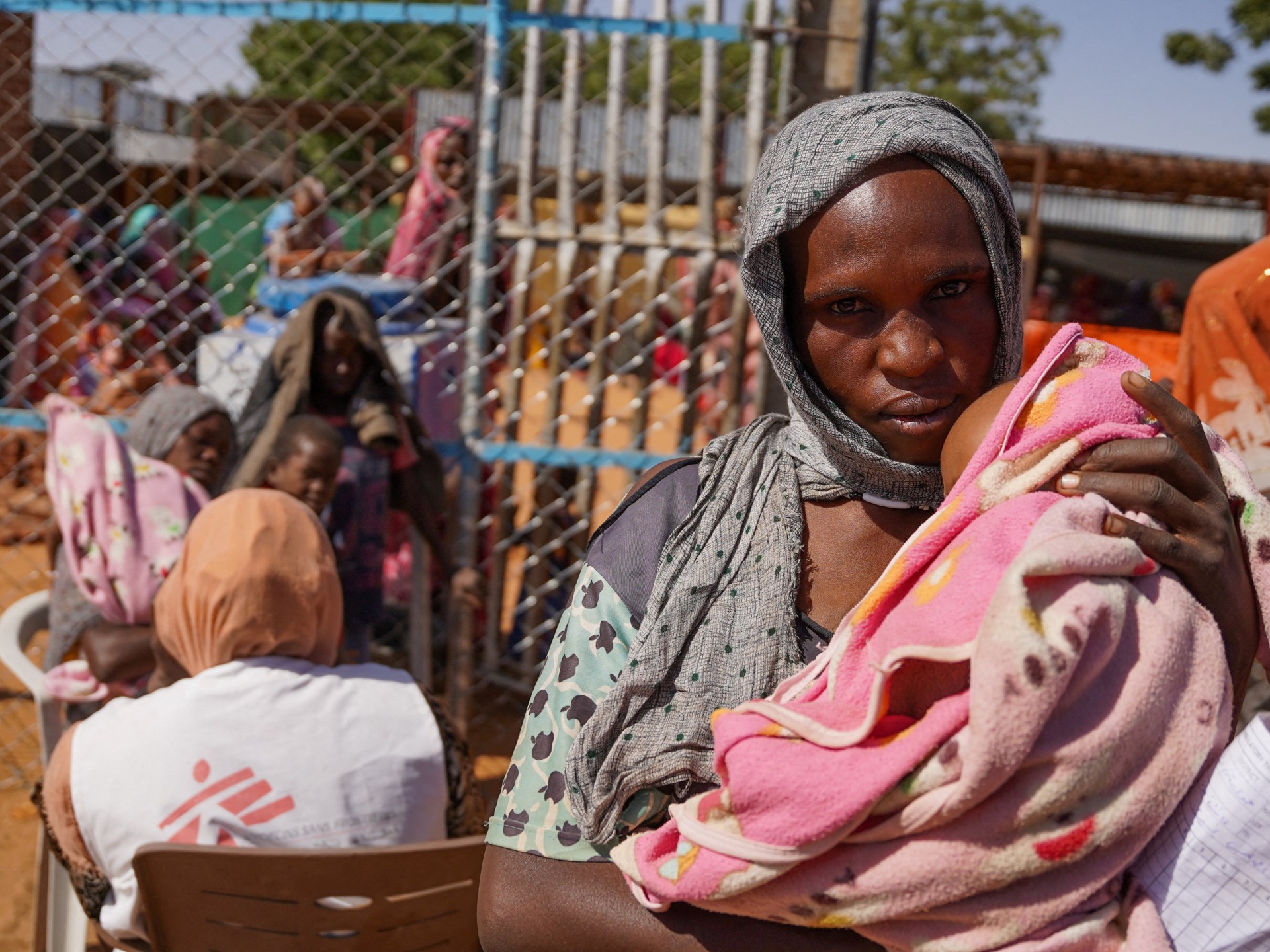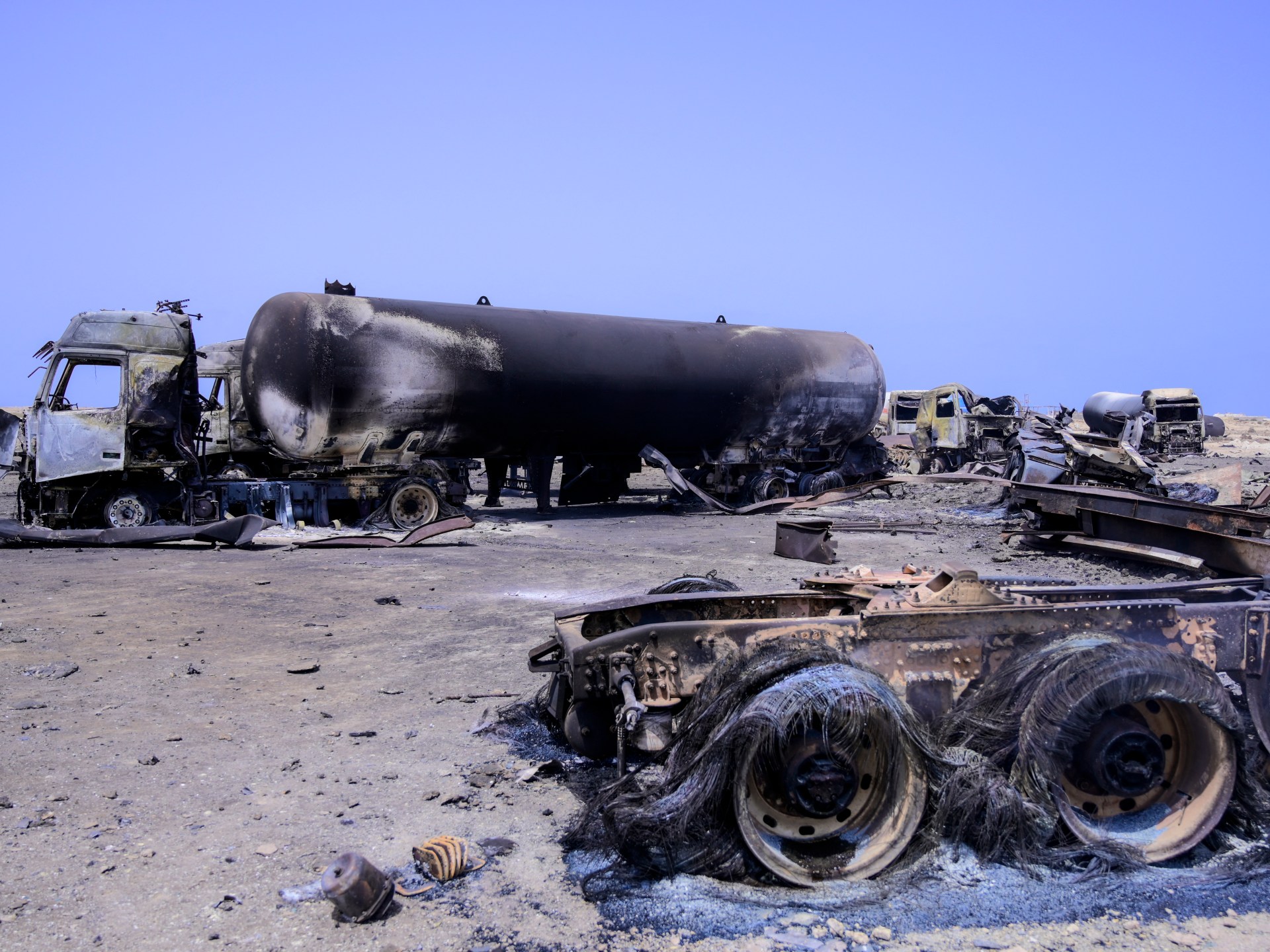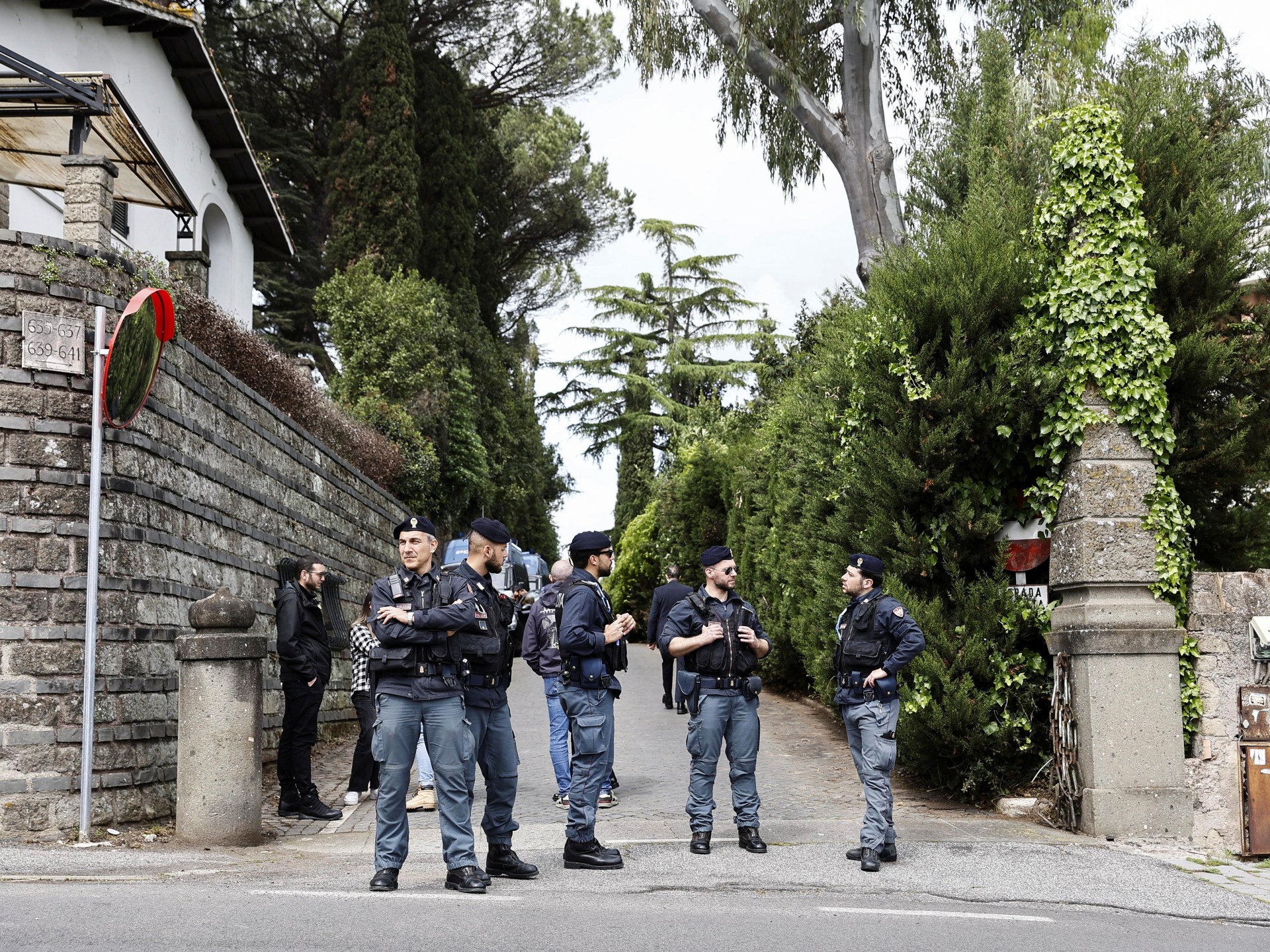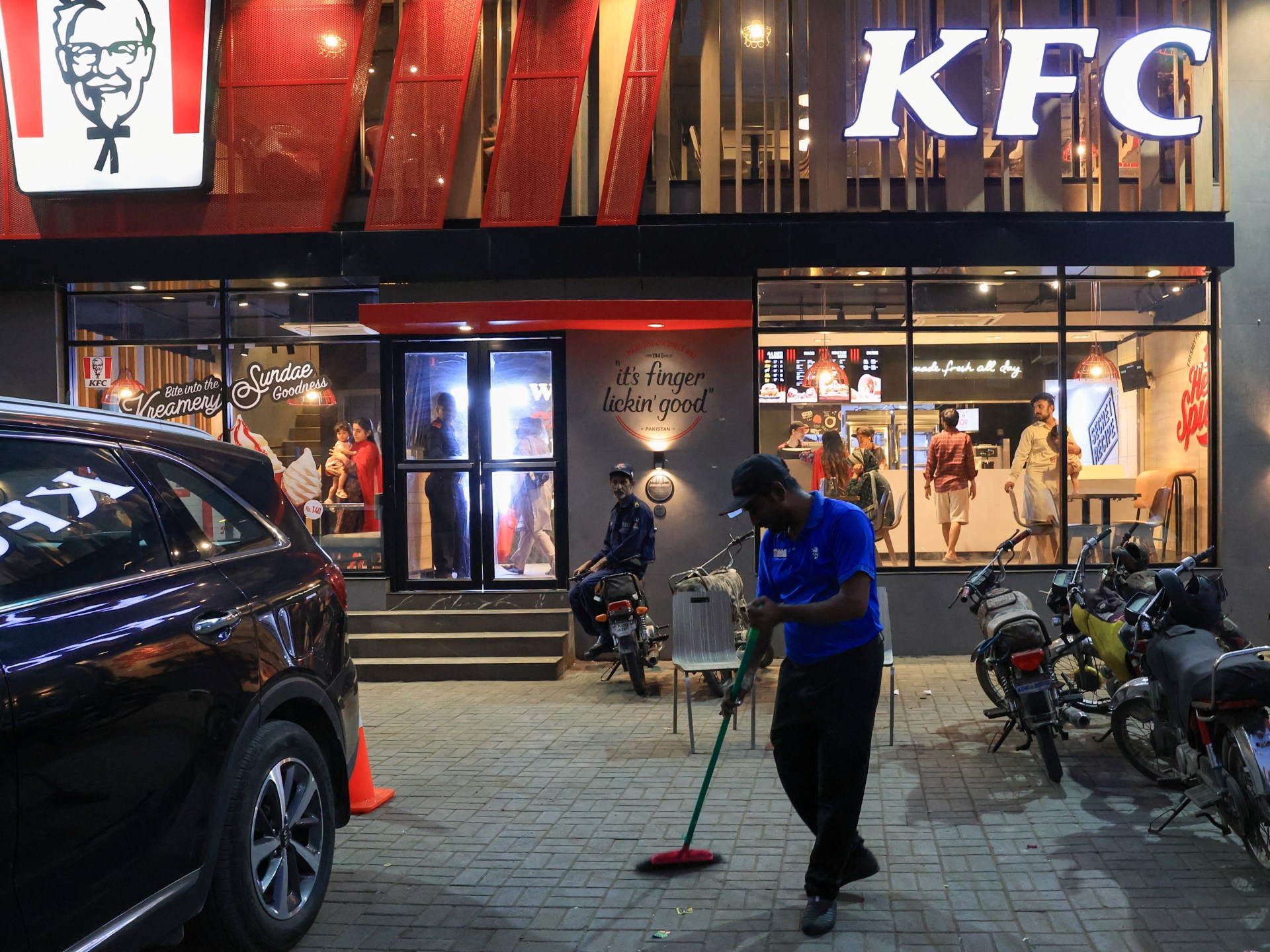Middle East
UNICEF says 12 million at risk of sexual violence as Sudan crisis deepens | Sudan war News

The war in Sudan has exposed more than 12 million people to “pervasive” sexual violence that is being used to “terrify” the entire population, according to the United Nations Children’s Fund (UNICEF).
As the war nears the two-year mark, UNICEF executive director Catherine Russell told a UN Security Council meeting on Thursday that the number of women and girls – and increasingly, men and boys – at risk of rape and sexual assault had increased by 80 percent over the last year.
Referencing data analysed by UNICEF, Russell said that 221 cases of rape against children were reported in 2024 in nine states, with 16 of these cases involving children under the age of five and four involving babies under the age of one.
“The data only gives us a glimpse into what we know is a far larger, more devastating crisis,” said Russell. “Survivors and their families are often unwilling or unable to come forward due to challenges in accessing services, fear of social stigma, or the risk of retribution.”
Much of the meeting focused on the suffering of the 16 million children needing humanitarian assistance this year as a result of the continuing war between the paramilitary Rapid Support Forces (RSF) and the Sudanese Armed Forces (SAF).
The fighting erupted in April 2023 and has since killed tens of thousands, uprooted more than 12 million people and created the world’s biggest humanitarian crisis.
Russell cited more than 900 “grave violations” against children reported between June and December 2024, with victims killed or maimed in 80 percent of cases – mainly in the states of Khartoum, Al Jazirah and Darfur.
The meeting took place as the SAF accused the RSF of targeting civilians in the besieged North Darfur state capital of el-Fasher, killing five children under the age of six and wounding four women on Wednesday.
Fighting in el-Fasher has intensified in recent months, as the RSF tries to consolidate its hold on Darfur after army victories in central Sudan. The city is the only one of five state capitals in the vast Darfur region that is not under paramilitary control.
‘Hollow’
Christopher Lockyear, the secretary-general of Doctors Without Borders (Medecins Sans Frontieres, or MSF), accused the warring sides of not only failing to protect citizens but also “actively compounding their suffering”.
“The war in Sudan is a war on people, a reality that grows more evident by the day,” Lockyear said.
Lockyear also criticised the UN Security Council’s repeated calls for a ceasefire as “hollow”.
“This council’s failure to translate its own demands into action feels like abandonment to violence and deprivation,” he said.
“Whilst statements are being made in this chamber, civilians remain unseen, unprotected, bombed, besieged, raped, displaced, deprived of food, of medical care, of dignity,” he added
The ongoing violence led MSF last month to suspend all activities in the famine-stricken Zamzam refugee camp, located near el-Fasher.
Sudan’s UN Ambassador, Al-Harith Idriss Al-Harith Mohamed, told the Security Council that the Sudanese government has a national plan for the protection of civilians and claimed Lockyear did not raise any issues with him in a previous private meeting.
Reporting from the UN in New York, Al Jazeera’s Gabriel Elizondo said diplomats in the Security Council frequently harked back to the Jeddah Declaration, an agreement committing to protect civilians that was signed by warring parties in 2023 under the mediation of the United States and Saudi Arabia.
“The Jeddah Declaration … is repeated by diplomats, particularly in the Security Council, over and over again as something that needs to be returned to,” he said. “Lockyear said that the international community needs to move beyond that and a new compact is needed for Sudan.”
Middle East
US attacks Yemen again after at least 80 people killed in Hodeidah | Israel-Palestine conflict News

UN chief Antonio Guterres says he is ‘gravely concerned’ about US air strikes this week on Yemen.
The United States has carried out 13 air strikes on Hodeidah’s port and airport, the Houthi-affiliated TV channel Al Masirah says, two days after a US air strike targeted the Ras Isa port, also in Hodeidah, killing at least 80 people and wounding more than 150.
Al Masirah also reported Saturday that three people were killed and four injured due to a US attack on al-Thawra, Bani Matar, and al-Safiah districts in the capital Sanaa.
The Houthis have promised to carry out “more operations” despite the ongoing US attacks.
US President Donald Trump’s administration announced a major military offensive against the Houthis a few weeks ago. It said the air strikes are aimed at forcing the Houthis to stop threatening ships sailing on the Red Sea on a route crucial to international trade.
Since November 2023, the group has reportedly launched more than 100 attacks on vessels it says are linked to Israel in response to Israel’s war on Gaza and in solidarity with Palestinians.
On Friday, Houthi official Mohammed Nasser al-Atifi told Al Masirah that the “American enemy’s crimes” will not deter the Yemeni people from supporting Gaza, but “rather will strengthen their steadfastness and resilience”.
The Houthis, also known as Ansar Allah or “supporters of God”, are an armed group that controls most parts of Yemen, including Sanaa. The group emerged in the 1990s but rose to prominence in 2014 when it seized Sanaa and forced President Abd-Rabbu Mansour Hadi to flee the country.
United Nations Secretary-General Antonio Guterres “is gravely concerned about the airstrikes conducted by the United States over the course of 17 and 18 April in and around Yemen’s port of Ra’s Isa, which reportedly resulted in scores of civilian casualties, including five humanitarian workers injured,” Guterres spokesman Stephane Dujarric said in a statement on Saturday.
Guterres expressed fears of damage to the port and “possible oil leaks into the Red Sea”, Dujarric added.
The strikes on Ras Isa aimed to cut off supplies and funds for the Houthis, the US military said. It was the deadliest attack of Washington’s 15-month campaign against the Iran-aligned group.
About 70 percent of Yemen’s imports and 80 percent of its humanitarian assistance pass through the ports of Ras Isa, Hodeidah and as-Salif.
Ras Isa also is the terminus of Yemen’s main oil pipeline, which, along with its port, are “critical and irreplaceable infrastructure” in Yemen, according to the UN Development Programme.
Middle East
Iran says progress in nuclear talks with US, confirms third round next week | News

After technical talks, senior negotiators expected to reunite on April 26, according to Iran’s foreign ministry.
Iran and the United States have completed a second round of indirect nuclear negotiations, which Iran’s foreign minister has described as “constructive” and moving forward with further meetings planned in the coming week.
Abbas Araghchi and US Middle East envoy Steve Witkoff held four hours of indirect talks at Oman’s embassy in the Italian capital, Rome, on Saturday, according to Araghchi.
“We succeeded in reaching a better understanding on certain principles and goals,” the diplomat was quoted by the semiofficial Tasnim news agency as saying. “The negotiations were conducted in a constructive atmosphere and are progressing.”
There has been no readout yet of the meeting from the US side.
The delegations – led by Araghchi and Witkoff, a billionaire real estate executive whom US President Donald Trump has dispatched on numerous foreign policy missions – stayed in separate rooms in the embassy as Omani Foreign Minister Badr al-Busaidi shuttled messages between them, according to Iranian officials.
Iran’s Ministry of Foreign Affairs said the parties will hold more indirect, technical-level talks in the coming days, followed by another meeting with senior officials on April 26.
There were useful indirect talks today between Iran and the United States conducted by Oman Foreign Minister in a constructive atmosphere.
The two sides agreed to continue the indirect talks in few days at technical level to be followed by another round at their own level on…
— Esmaeil Baqaei (@IRIMFA_SPOX) April 19, 2025
“I hope that after next week’s technical sessions, we’ll be in a better position,” Araghchi said, according to Tasnim. “There’s no reason for excessive optimism or pessimism.”
‘Negotiations to pick up’
Al Jazeera’s James Bays, reporting near the Omani diplomatic compound in Rome, said the Iranian response was “very positive” for a delegation that “had seemed pretty negative going into the talks”.
Next week’s planned talks mean “the pace of negotiations is going to be picked up”, Bays said.
The latest meeting comes a week after Iran and the US came together in Muscat for their first high-level discussions since Trump in 2018 unilaterally abandoned a landmark nuclear accord signed and brokered by world powers in 2015.
The Iranians “are looking for a kind of consistency when it comes to the current talks”, Al Jazeera’s Tohid Asadi reported from Tehran.
Will US accept civilian nuclear programme?
Western governments, including the US, have long accused Iran of seeking to develop nuclear weapons – an allegation Tehran has denied, insisting its nuclear programme is solely for peaceful civilian use. On Wednesday, the head of the International Atomic Energy Agency, Rafael Grossi, said Iran was “not far” from possessing a nuclear weapon.
Grossi was also in Rome on Saturday meeting Italian Foreign Minister Antonio Tajani. Grossi’s nuclear watchdog would likely be central in verifying compliance by Iran should a deal be reached, as it did with the 2015 accord.
The US and Iran have had no diplomatic relations since shortly after Iran’s 1979 Islamic Revolution. After returning to office in January, Trump revived his “maximum pressure” sanctions campaign against Tehran, but in March, he sent a letter to Iranian Supreme Leader Ali Khamenei calling for renewed negotiations – while warning of military consequences if diplomacy fails.
“I’m not in a rush” to use force, Trump said on Thursday. “I think Iran wants to talk.”
On Friday, Araghchi said the US showed “a degree of seriousness” during the first round of talks but questioned Washington’s “intentions and motivations”.
Bays said the heart of the dispute remains whether Iran may maintain a civilian nuclear programme – or whether, as hardliners in Washington insist, it must dismantle its nuclear programme entirely.
“All they’ve been talking about last week in Muscat and here in Rome is a framework for the discussions and what they want to achieve,” Bays said. “They have not been discussing the nuclear detail, … and the devil is in the detail on these things.”
Middle East
Over 170 arrested for attacks on Pakistan KFC outlets in Gaza war protests | Israel-Palestine conflict News

Western brands have been hit by boycotts and other forms of protests in Muslim-majority countries due to the Gaza war.
Police have arrested close to 200 people in Pakistan in recent weeks after more than 10 group attacks on outlets of the United States-based fast-food chain KFC, sparked by anti-US sentiment, unconditional US backing for Washington’s close ally Israel and opposition to Israel’s war in Gaza, officials say.
The fast-food chain has become a target of protest and boycott calls by Islamist parties since the start of the war in Gaza as they link the brand to US support for Israel.
At least 178 people have been arrested, the officials said this week.
Police in major cities in Pakistan – including the southern port city of Karachi, the eastern city of Lahore and the capital, Islamabad – confirmed at least 11 incidents in which KFC chicken restaurants were attacked by protesters armed with sticks and vandalised.
A police official, who spoke on condition of anonymity, said one KFC employee was shot and killed this week in a store on the outskirts of Lahore by unknown gunmen. The official added there was no protest at the time and police were investigating whether the killing was politically motivated or for some other reason.
In Lahore, police said they were ramping up security at 27 KFC outlets after two attacks took place and five were prevented.
“We are investigating the role of different individuals and groups in these attacks,” Faisal Kamran, a senior Lahore police officer told the Reuters news agency, adding that 11 people, including a member of the Islamist party Tehreek-e-Labbaik Pakistan (TLP), have been arrested in the city. He added the protests were not officially organised by the TLP.
TLP spokesman Rehan Mohsin Khan said the group “has urged Muslims to boycott Israeli products, but it has not given any call for protest outside KFC”.
“If any other person claiming to be a TLP leader or activist has indulged in such activity, it should be taken as his personal act which has nothing to do with the party’s policy,” Khan said.
Western brands have been hit by boycotts and other forms of protests in Pakistan, other Muslim-majority countries and several Western nations over Israel’s military offensive in the Gaza Strip.
In February last year, McDonald’s cited boycott campaigns in the Middle East, Indonesia and Malaysia for sales growing just 0.7 percent during the fourth quarter of 2023, compared with 16.5 percent growth in the same quarter the previous year.
Unilever – which produces Dove soap, Ben & Jerry’s ice cream and Knorr stock cubes – also said sales in Indonesia in the same quarter had experienced a double-digit decline as a result of “geopolitically focused, consumer-facing campaigns”.
A KFC restaurant in the Pakistan-administered region of Kashmir was also set on fire in March last year as protesters chanted “Free Palestine.”
More than 51,900 people have been killed in Gaza during Israel’s war, which began 18 months ago.
At least 1,139 people were killed in Israel during the Hamas-led attacks of October 7, 2023, and more than 200 were taken captive.
KFC and its parent company Yum Brands have not yet responded to news of the arrests in Pakistan.
-

 Education1 day ago
Education1 day agoHarvard’s battle with the Trump administration is creating a thorny financial situation
-

 Sports2 days ago
Sports2 days agoAaron Rodgers ‘not holding anybody hostage’ as he decides his future, retirement a possibility
-

 Europe2 days ago
Europe2 days agoGerman police raid home of teenage boy suspected of making highly toxic warfare agent
-

 Europe1 day ago
Europe1 day agoThe Trump administration says Europe is taking advantage of the US. That’s not exactly true
-

 Europe1 day ago
Europe1 day agoTrump’s ‘lone ranger’: How Steve Witkoff became the defacto point man on America’s foreign policy challenges
-

 Lifestyle1 day ago
Lifestyle1 day agoSweets from the sky! A helicopter marshmallow drop thrills kids in suburban Detroit
-

 Conflict Zones1 day ago
Conflict Zones1 day agoTrump says US may ‘pass’ on helping end war if Russia, Ukraine resist deal | Russia-Ukraine war News
-

 Sports2 days ago
Sports2 days agoManchester United pulls off ‘miracle’ Europa League victory against Lyon



